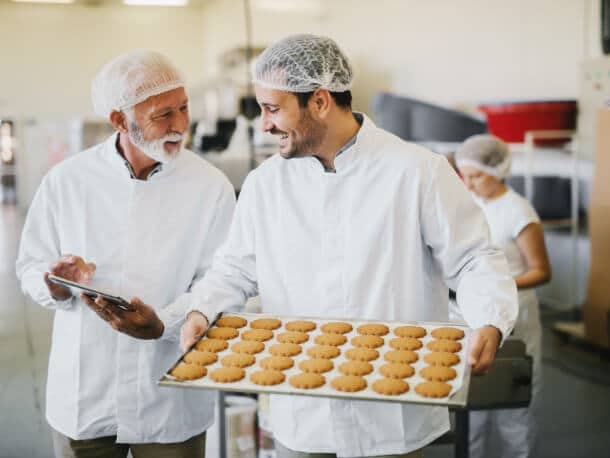Multi-sector, high-risk food handler course (includes mandatory training on allergens and COVID-19 prevention)
A food handler is any person who comes into contact with food products in their work activity, requiring them to receive training that guarantees adequate knowledge of food hygiene to avoid health problems and poor quality of service.
Why should you get your food handler certificate with us?

Description
The main objective of this course is to provide knowledge and promote compliance with food hygiene standards.
Check the current regulations here.
Once you have finished the online course, we will send you the certificate by email where you can download it to submit the fully valid certification to the company that is requesting it or to the competent authority.
What is the certificate like?
The certificate that you will receive, or what was previously called the “food handler certificate”, is a personalised diploma with your name on it. It will be valid both if you print it or if you submit it by email.

WE GUARANTEE 100% OF THE TRAINING AND THE VALIDITY OF THE CERTIFICATE

What jobs can i use the food handler certificate for?
The Food Handler Certificate is a document certifying that you have successfully passed the training course. You need it to work in bars, restaurants, supermarkets, nursery schools, food transport companies, packaging and handling factories, hospitality, commerce, agri-food industry, meat and fish sector, school cafeterias, nursing homes and home care services, among other areas.
In general, you should receive training on Food Safety and Hygiene if your work activity has you coming into contact with food products during their preparation, transformation, production, manufacture, packaging, storage, transport, distribution, sale, supply and service.
Topics
1 – Foods
- Hygienic food handling
- Foods. Composition
- Food allergies and intolerances
- Types of food hazards
- Worker allergies
- Disease-health process
- Nutritional disorders
- Definition and classification. CXC 80-2020
- Effects on food
2 – Food contamination
- Food contamination
- Multiplication of microorganisms
- Prevention of FDs
- FDs-Listeria, bacillus cereus and others
- Food and latex allergies
- High risk foods
- Types of contamination
- Foodborne diseases (FD)
- FDs. Salmonella, botulism and staph
- Parasitic diseases
- How to act in the event of a food or latex allergy
3 – Food preservation
- Food preservation
- The cold chain
- Food packaging
- Other preservation methods
- Labelling
- New regulations. Consumer information
- Information to the final consumer.
- Cooling techniques
- Heating techniques
- Food irradiation
- Additives
- New labelling
- Detailed food information provided to the consumer
4 – Self-control
- Handler hygiene
- HACCP
- Pest control
- Waste control
- Training plan
- Control of suppliers
- Good Practice Guides
- Cleaning and disinfection plan
- Maintenance plan
- Donations and surplus material
- Water supply
- Traceability
COVID-19: Food safety
- Coronavirus: Basic concepts
- COVID-19: Hygiene practices for plant personnel
- COVID-19: In-plant protective clothing and equipment
- COVID-19: Prevention of cross contamination
- COVID-19: Possible product changes
- COVID-19: General information for the food industry
- COVID-19: Control of the entry of operators
- COVID-19: Cleaning and disinfection operations
- COVID-19: Control plan
- COVID-19: Specific measures in supermarkets
Contact us
If you have any questions, our team of qualified professionals will be able to answer them.
Legal basis: The User’s consent when requesting information through our contact form, and by ticking the acceptance box for sending information.
Intended audience: Data transfers are not planned.
Retention: Once your request is answered by our form or by email, if no further communication has been generated. If you have accepted to receive marketing communications, until you request to unsubscribe.

